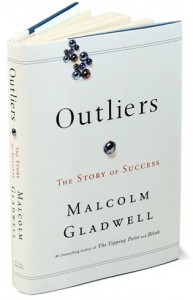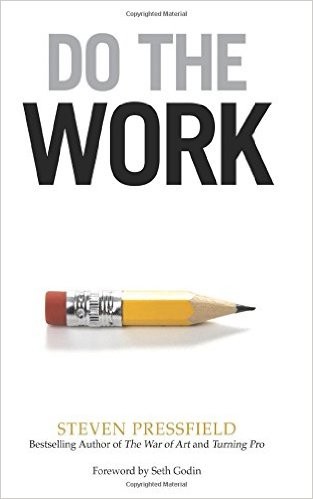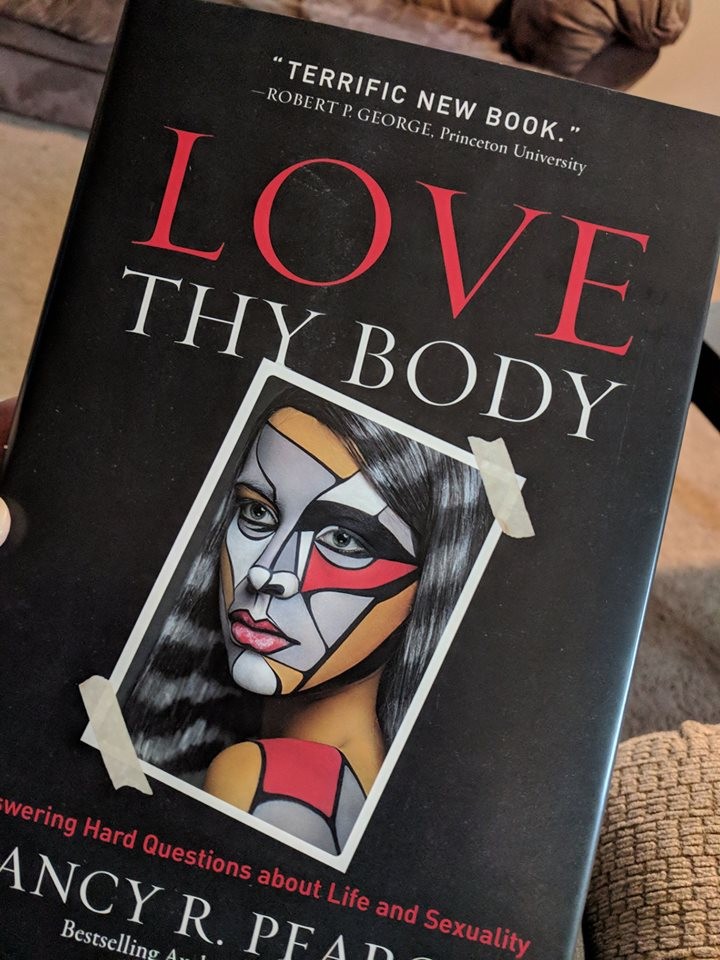Outliers
 My pastor mentioned Outliers in a Sunday school class. He’d read part of it, and it sounded interesting. I picked up a copy at the library to read, but I wasn’t expecting it to provoke so much thought or to have such an impact. It’s really given me a lot to think about.
My pastor mentioned Outliers in a Sunday school class. He’d read part of it, and it sounded interesting. I picked up a copy at the library to read, but I wasn’t expecting it to provoke so much thought or to have such an impact. It’s really given me a lot to think about.
“Outliers” are exceptional people — people who excel far beyond the norm in some way. Malcolm Gladwell takes a number of such figures — software gurus, pilots, hockey players, lawyers, geniuses — and examines their stories. He ends up showing that all of these people emerge from social, economic, cultural, geographic, historical contexts, rather than being “self-made.” “It is not the brightest who succeed,” he concludes, “…Nor is success simply the sum of the decisions and efforts we make on our own behalf. It is, rather, a gift. Outliers are those who have been given opportunities — and who have had the strength and presence of mind to seize them.”
He puts it pretty strongly there. I don’t agree with quite such a strong emphasis on outside factors; the giftedness of these individuals is crucial to their success, too. But looking at the Bible, I see that context matters. Look at Joseph, who was prepared for his position of power in Egyptian government through the seeming tragedy of his betrayal and enslavement. Or look at Moses, prepared for leadership in Pharoah’s household. Look, even, at Jacob, a weasel, but one who was loved and promoted by his mother, and so he rose above his brother in the long run. It all seems to reinforce what Gladwell refers to as “the Matthew effect,” based on Matthew 25:29.
The book is interestingly written and researched, and it made me think deeply about a number of things — only a few of which I’ll mention here, in order of ascending importance.
First, parenting. There is a difference, Gladwell explains, between the way different classes parent. Lower class, poorer parents tend to care for their kids, but let them develop on their own. Upper and middle class parents are much more involved, teaching their children how to assert themselves, and how to live comfortably in the world of people. Part of the way they do this is through conscious instruction in how to communicate and carry themselves, and part of it is through scheduling their children’s time and exposing them to lots of different experiences and activities.
I find that I’m a blend of these approaches. I think free time is important, especially for younger children. But I also see the value of giving them varied experiences in varied social contexts. I’m not sure what exactly this means for us, but I felt this book affirmed the direction my thoughts are already going on that score. I have no desire to overschedule my kids’ time, but I think it’s time to be more proactive about getting them involved in more activities.
Gladwell describes the best parents as actively looking for their children’s gifts and interests, and seeking out ways to cultivate them. I’m pretty good on the first half of the sentence but tend to flounder on the last half. I mean, I find play options for them to do the things they want to do; I have one daughter who wants to be a museum exhibit designer, and I get her dioramas to build, clay and legos to create with, drawing supplies, miniatures. But what can we do outside our four walls to cultivate this design interest? How can we bring it outward into more cooperative endeavors with others? (My other daughter is a little less focused. She wants to be either a pet store owner, a horse trainer, or an artist. I feel a little less pressure there…)
Another thing the book gave me lots of food for thought on was education. I think any home educator would find this book stimulating, not necessarily because we’ll agree with all of Gladwell’s conclusions (I certainly didn’t), but because there is so much interesting material about the learning process, and the values common to excellent students. As a teaser, I’ll mention rice paddies, taking 22 minutes to solve a math problem, and how Asian cultures count as factors Gladwell mentions. If you want to see how on earth they fit together, you’ll enjoy reading this.
Ultimately, of course, the book makes me think about what constitutes “success.” The operative definition for Gladwell seems to include wealth, recognition, and full realization of potential. He argues for a culture in which more people can succeed in these terms, one that could be brought about if we made a few key changes in our thinking. As a Christian, I find myself thinking about how I would define success differently. I believe there is a loving Creator who has a purpose for me. Wealth and recognition may or may not be a part of that. True success would mean transformation of the thoughts and intents of my heart toward Christlikeness, toward love for others.
But I think it also involves full realization of potential, as in the outliers Gladwell discusses. How do I parent in such a way as to help my children “succeed” as followers of God? How can I use the knowledge in this book to help my children become the people God made them to be, with the influence he intends for them to have? How can I help them to reach beyond the limits I feel myself? They have gifts and talents and aspirations meant to be realized, meant to be shared with the world. We all do.
One of the most interesting things Gladwell points out is that outliers all seem to follow the 10,000 hour rule. The Beatles, Bill Gates, Steve Jobs, the Jewish lawyers who specialized in corporate takeovers — all of them had already put in 10,000 hours practicing in their field of expertise so that when their moment of opportunity came, they were prepared for it. It takes 10,000 hours, one neurologist explains, for the brain to assimilate all it needs to know to achieve true mastery of something. Gladwell points out that it’s next to impossible for anyone to log 10,000 hours at something by the time they’re a young adult — unless they have parents who support and encourage them. This book has been a wake-up call to be more intentional about some things with my children, and I believe that in the big picture I’m going to be very glad I read it.




9 Comments
Amy @ Hope Is the Word
I’ve wanted to read this one since it was discussed so much on The Well-Trained Mind forums. Maybe I’ll get around to it in the new year. Thanks for a tantalizing peek into it! ;-)
Janet
Huh! I never heard of it before my pastor mentioned it. Sounds like it might be worth a click over to the WTM forums!
Barbara H.
We were watching a documentary on Einstein once, and apparently he had a horrible family life, at least in the early years. I wondered if being a genius in one area meant a lack in other areas. I think I’d prefer my kids to be balanced rather than have a lopsided excellence in one area.
For my kids, none of them had a clear idea of what they wanted to do until college years for one, and one past college has a job that he likes but still doesn’t know if he wants to make a career of it. That makes it hard to give them experiences to help them in their field some day. They all passed through phases of what they wanted to do that didn’t last. I liked the idea of giving them a variety of experiences so they could both learn from them but also try different things to see what might spark an interest.
Janet
It’s certainly a book that gets you thinking about such things. I noticed that one thing conspicuously absent is any discussion of character. Especially in response to adversity. That plays a huge role in success, yet it is nowhere mentioned in this book. In fact, the unspoken assumption seems to be that eliminating adversity and maximizing advantage is the way to success. But I can think of many other dimensions to the issue.
My children are young, and I don’t expect them to have their future careers chosen yet. But when the one speaks of design as an interest, it squares with what I observe in her. I want to encourage her in it. I am strongly opposed to the kind of hyperscheduling and parental pushing Gladwell at times seems to advocate in these pages. But I don’t want to leave my children completely on their own in pursuing their life’s purpose either.
My own parents seemed to find it easier to encourage my interest in music than in writing. Music is easier. Piano lessons, opportunities to play at church, opportunities to play for school musicals. But writing seems to have been the deeper, more longstanding interest, and it’s harder to set in a social context. They saw it and have always encouraged me to write. They even gave me a typewriter when I turned 8. (It was green plastic.) I don’t remember being all that focused on writing, but apparently they saw something they wanted to encourage, and may not have known how beyond that. A fifth grade teacher submitted a story I wrote to a magazine, so there was that too. Then later, my doctoral advisor was a primary influence in cultivating me as a writer, and I have one book to show for it. But somehow I have reached age 45 and still don’t feel like I’ve really left the ground yet. I’d like to be able to help my children find God’s vision for their lives earlier if I can.
It’s not terribly uncommon for people reach their stride later in life. But if I can help my children hone in sooner, and have the confidence to go for it in whatever area they thrive, I figure it can only help them. But establishing them in the faith — in a solid and beautiful character, guided by the Holy Spirit, constant in the face of whatever adversity life throws at them — is to me a much more basic and important foundational ingredient of success than it is to Gladwell. He never even mentions it.
bekahcubed
I’ve heard of this book through a podcast I listen to. The podcast was mainly focusing on the 10,000 hour rule. Since I heard of it as an adult without children, I’d never thought of encouraging children to focus that intently on something.
I think I agree somewhat with Barbara’s comment of preferring balance. I think of the “Tiger Mother” thing when I think of a child logging 10,000 hours on one thing prior to adulthood. Of course, that’s not to say that a child couldn’t get a good start on the 10,000 hours.
If reading were something one could be a genius in, I’d have logged my 10,000 hours by my very early twenties at least. But as far as specific things?
It sounds like a very interesting book.
Dennis King
I’m glad that you found the book to be beneficial, Janet. Obviously I need to go back and read the rest of it!
Janet
I hope you’ll share your impressions on it when you do, Pastor!
Bekah, I agree about balance – and disagree. I’m not sure I’ve ever met a “balanced” person who’s very interesting. It’s the people with vision and passion and skill at something that are the memorable ones. That being said, I don’t believe in fostering too much intensity in young kids, or driving them to be perfectionists or overachievers. But most kids have interests and inclinations that can be encouraged and supported.
Carol in Oregon
So it’s the day before Christmas Eve…I am not capable of being “ready” at this point, although the most important stuff is done. But, thanks to you, I want to ignore my lists, go to the library, and check out this book.
It’s been on my TBR list for over a year, and on my wish list at Paperbackswap. On a whim, I checked our library a few months ago to see if they had it. Yes, two copies! I disciplined myself not to check it out until I got over a few other hurdles.
This is a fractured way of saying “Thank you for this review. It is excellent.” And Bekah’s comment about logging 10,000 reading brought out a wide grin and thumbs up!
Merry Christmas!
Janet
Thank you, Carol. Looking forward to your thoughts on this book — Merry Christmas to you too!
Interestingly, after closing Gladwell’s book, I opened John Eldredge’s Walking with God and read this:
“The good news is that you can’t figure out life like that. You can’t master enough principles and disciplines to ensure that your life works out. You weren’t meant to, and God won’t let you… That whole approach to life — trying to figure it out, beat the odds, get on top of your game — it is utterly godless. Meaning, entirely without God. He is nowhere in those considerations.”
More food for thought. I’m aware that there are dimensions this book leaves out entirely, but there is wisdom to be gleaned too.